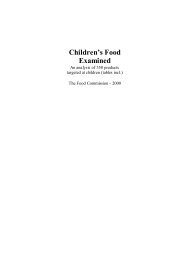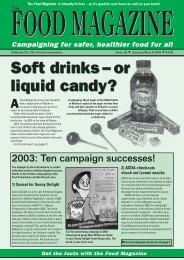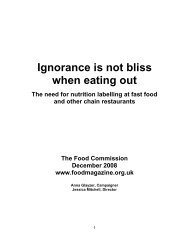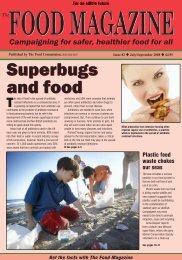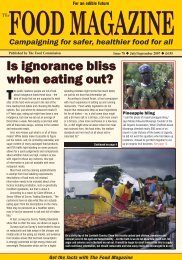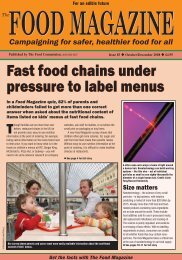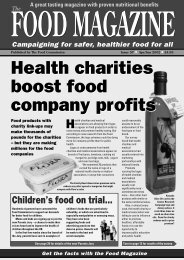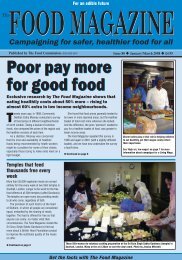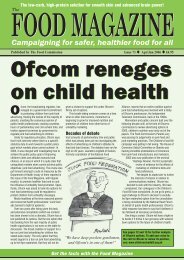Children's Nutrition Action Plan - The Food Commission
Children's Nutrition Action Plan - The Food Commission
Children's Nutrition Action Plan - The Food Commission
You also want an ePaper? Increase the reach of your titles
YUMPU automatically turns print PDFs into web optimized ePapers that Google loves.
Children’s <strong>Nutrition</strong> <strong>Action</strong> <strong>Plan</strong><br />
Introduction<br />
<strong>Food</strong> and nutrition policies are very much in the news these days. <strong>Food</strong> policies across<br />
Europe have been the attention of much media concern, not just over agriculture and food<br />
supply policies, BSE and dioxin in our food supplies, but in a quieter way there has been<br />
mounting concern over European rates of heart disease and cancer, and rising incidence of<br />
obesity. <strong>The</strong> World Health Organisation’s nutrition office for the European Region has<br />
launched a four-year <strong>Food</strong> and <strong>Nutrition</strong> <strong>Action</strong> <strong>Plan</strong> which considers some of the issues we<br />
look at in this document. <strong>The</strong> UK Department of Health has launched a series of policy<br />
documents on public health policy which include food, diet and nutrition concerns. Also, the<br />
recently launched UK <strong>Food</strong> Standards Agency is also developing a nutrition policy.<br />
Children’s food is a key element of food policies for several good reasons. For a start, what<br />
children eat not only affects their health at the time, but will make a significant difference to<br />
their later health. For instance, after around the age of four, children who are overweight are<br />
increasingly likely to be overweight or obese as adults. Before they reach their teens, children<br />
can show the first signs of cardiovascular disease in the tissues of their arterial walls. By this<br />
age, girls have already begun to lay down the nutritional base for their future pregnancies,<br />
which in turn will affect the foetus and long-term health of their children. <strong>Nutrition</strong> in<br />
childhood is therefore of importance for public health and the costs to our health services for<br />
years to come.<br />
Children are less able to make decisions about their own best interests than are well-informed<br />
adults. <strong>The</strong> regulation of people’s free choice about the foods they eat is often attacked as<br />
‘nannyism’ but this fails to apply when it comes to children. We acknowledge the need to<br />
protect children through social controls – we ban the advertising of alcohol and tobacco to<br />
children, and we prohibit children from buying drink and cigarettes until they are considered<br />
old enough to know what they are doing. But with food, society has been less assertive and<br />
has allowed the free-choice and free-market arguments to prevail.<br />
This state of affairs is doing our children no good. <strong>The</strong> present document reviews some<br />
of the main issues that concern children’s food and nutrition, and looks at possible<br />
interventions or targets that might be constructed, to help us protect children’s health in the<br />
future and improve what children are eating.<br />
<strong>The</strong> Children’s <strong>Nutrition</strong> <strong>Action</strong> <strong>Plan</strong>, published by <strong>The</strong> <strong>Food</strong> <strong>Commission</strong><br />
3



